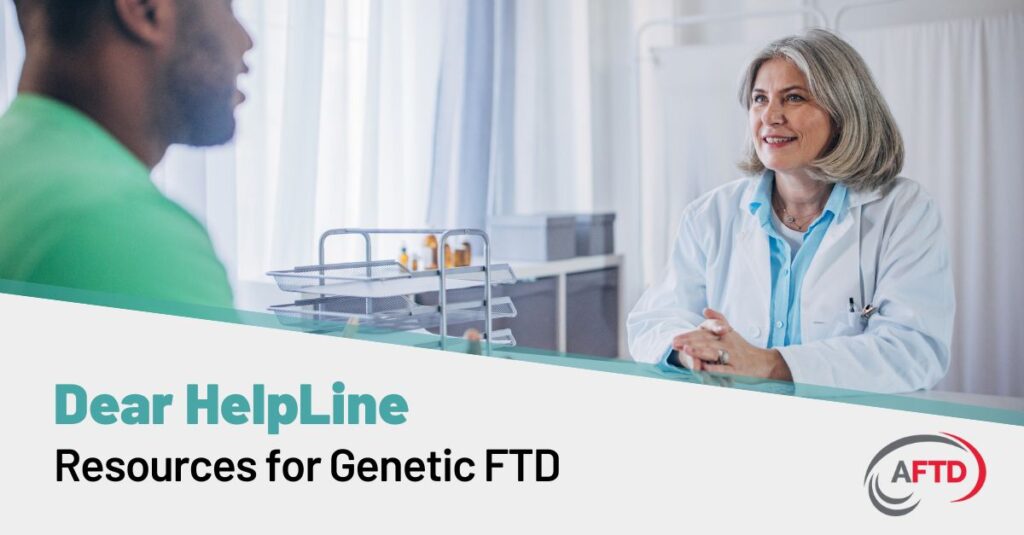Dear HelpLine: Resources for Genetic FTD

Dear HelpLine,
I am 25 years old and I just learned my dad’s FTD is genetic. I’m planning to get married soon. Now that I know I may also be at risk, I don’t know where to begin.
When a loved one is diagnosed with FTD, relatives often wonder if they face the same risk. The majority of FTD is not inherited. However, roughly 40% of people diagnosed with FTD do have a family history of FTD and/or related conditions, such as ALS, another dementia, progressive challenges with language, a psychiatric diagnosis, or a Parkinson’s-like movement disorder. In these families, we are more likely to identify a genetic cause for their FTD.
While familial history may offer clues as to whether FTD runs in the family, there is often more to the story. Genetic FTD may appear to be sporadic because other relatives may have been misdiagnosed. Sometimes misunderstanding and conflict cause frayed family relationships and poor communication amongst relatives, or a relative may have passed away early for an unrelated reason, prior to developing symptoms. Understanding a genetic risk in the family helps people anticipate who else may be at risk and prepare for future care needs. In some instances, a genetic diagnosis may open important research opportunities. (You can learn more by watching sessions from AFTD’s inaugural Genetic FTD Symposium, held in May 2025.)
When a person has symptoms of FTD, genetic testing can confirm the diagnosis is correct and offer additional insights for extended family. This is known as diagnostic testing. When a person has a family history of FTD, but are themselves without symptoms, we consider this to be predictive testing.
AFTD strongly recommends genetic counseling before genetic testing, particularly for people considering predictive genetic testing.
Preparing for a genetic counseling appointment
Prior to scheduling an appointment, we recommend viewing the recent AFTD Educational Webinar, “Navigating Social and Legal Challenges in Familial FTD,” which reviews some considerations prior to testing, including steps to limit risks. It also discusses the Genetic Information Nondiscrimination Act (GINA), a federal law meant to prevent genetic discrimination. The webinar helps you understand your rights, reviews limitations in that law’s protections, and explains what steps may be helpful prior to seeking a genetic evaluation.
Another AFTD Educational Webinar, “How to Find a Genetic Counselor,” explains the different paths to finding a genetic counselor who can support you in making a well-informed decision about whether genetic testing is the right choice for you at this time.
One of the most deeply personal aspects of familial or genetic FTD is how to approach starting a family. Whether or not you have had predictive testing, a potential risk of developing FTD complicates decisions around family planning, as do the opinions of family, society, and medical professionals. Download AFTD’s overview of reproductive options when FTD runs in the family.
On the AFTD HelpLine, we frequently hear from people who need community and support. FTD is complicated and isolating. AFTD support groups offer connections with others who truly understand FTD and its impact on the family. AFTD offers over 90 support groups, including those specifically for people impacted by genetic FTD. Contact AFTD’s HelpLine at info@theaftd.org or 866-507-7222 to learn if one of these support groups may be helpful for you.
There are currently a number of clinical trials testing experimental treatments that may stop or slow FTD’s progression in people impacted by genetic FTD. The best way to find research opportunities that match your interests is by joining the FTD Disorders Registry. AFTD and the Bluefield Project to Cure FTD co-manage the Registry, which shares FTD research opportunities with our community. Persons diagnosed, current and former care partners, family members, and friends are all welcome to join. Input from Registry participants contributes to a better understanding of the impact of FTD on individuals and their families. With a rare disorder such as FTD, having a single repository of information from as many people as possible is critically important. The Registry highlights the community’s needs and drives further research. Greater participation magnifies the benefits of the Registry.
Learning that your family member’s FTD is genetic can feel overwhelming, with broad impacts on relationships, planning for the future, and many major life decisions. But knowledge is also power. When families understand what they’re facing, they’re better equipped to make informed, thoughtful choices.
The AFTD HelpLine is here to support you, connecting you with genetic counselors, medical professionals, and a community who understands.
By Category
Our Newsletters
Stay Informed
Sign up now and stay on top of the latest with our newsletter, event alerts, and more…

